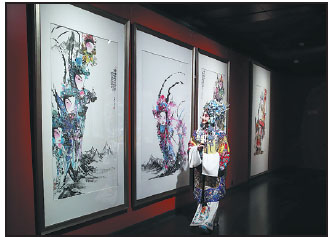Peking Opera finds a colorful new canvas
Dressed in lavish costumes, makeup and exquisite headdresses, two actresses from China National Peking Opera Company, Fu Jia and Zhou Jing, perform extracts from two well-known Peking Opera works, The Drunken Concubine (Gui Fei Zui Jiu) and The Jewelry Purse (Suo Lin Nang) at the National Center for the Performing Arts in Beijing on a recent afternoon.
Sitting in the audience is Ding Liren, who is not just enjoying the performances but also sketching on his notebook.
"I love the look of Peking Opera actors, the movements and the emotions expressed. It is art," says the 86-year-old artist. It's a habit, which Ding has cultivated since he was 6 years old.
Known for his paintings of Peking Opera characters, Ding was in Beijing to open an exhibition, titled Rhythm of Brush and Ink, Exhibition of Chinese Theatric Figure Paintings, which is on at the NCPA. It runs till March 15.
With nearly 80 paintings from eight Chinese artists, including Ma Shulin, Su Hongsheng and Zhang Peicheng, the exhibition portrays classic Peking Opera figures, such as the Monkey King, the main character in the Chinese classical novel Journey to the West, and Mu Guiying, a legendary female warrior from the Song Dynasty (AD 960-1279).
Born in Jiaojiang, Taizhou city of East China's Zhejiang province, Ding comes from a family of intellectuals, who liked inviting local Peking Opera troupes to perform at their home. That's how his initial fascination with Peking Opera started.
As Ding recalls, the actors from Peking Opera troupes made friends with his family. Ding liked sneaking backstage, to observe the preparations for their performances and he also toured with the troupe.
"Onstage, they could be emperors and princesses, but behind the curtain they sipped tea and chatted with fellow actors. I was very interested in their lives," says Ding.
He started learning traditional Chinese ink painting at 6 and the actors became the main characters in his paintings.
"They are like family members. I do not just paint Peking Opera figures but also the actors," he says.
Unlike Ding, Ma Shulin, the deputy director of the National Art Museum of China, recalls that he watched the classic Peking Opera show, Mu Guiying Takes Command of Troops (Mu Guiying Gua Shuai), for the first time in 1985 at Beijing's Chang'an Grand Theater when he was 29 years old.
"I didn't know the story. I was drawn to the martial arts and the characters. After returning home, I painted a scene from the show," says Ma, 60, who was born in Hebei province and graduated from Lu Xun Academy of Fine Arts.
After his first experience, Ma went on to watch more Peking Opera shows and continued painting Peking Opera figures.
"Though Peking Opera stories are not real, the characters reflect friendship, romance and family values," says Ma.
He also says that traditional Chinese ink painting and Peking Opera are national treasures.
"I hope the audiences can see the beauty of these two art forms in the exhibition," he says.
According to Ma, one of the most famous Chinese artists who portrays Peking Opera figures is Guan Liang (1900-86). His Peking Opera themed works include Stealing the Royal Horse and Farewell to My Concubine.
Guan's unique approach, rather than being realistic, has inspired many Chinese artists.
Zhang Peicheng is one of those inspired by Guan. He has 10 works at the exhibition. Zhang, 68, started painting Peking Opera figures a decade ago.
Zhang, who once lived near Shanghai Dashijie, a popular stage entertainment landmark, watched many Peking Opera shows and he is most interested in Peking Opera facial masks.
"Each facial mask represents a different character. I try to capture something which is between real and surreal," he says.
chennan@chinadaily.com.cn
|
A Peking Opera performer visits the ongoing exhibition, Rhythm of Brush and Ink, Exhibition of Chinese Theatric Figure Paintings, at the National Center for the Performing Arts.Jiang Dong / China Daily |



















